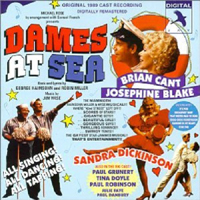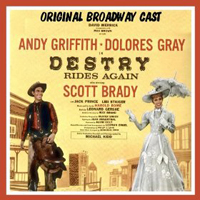 Original Broadway Cast, 1958 (Decca)
Original Broadway Cast, 1958 (Decca)  (4 / 5) Harold Rome’s whip-cracking western musical comes complete with good guys, bad guys, saloon girls, respectable prostitutes, and gun fights. The atmospheric Decca cast recording stars Andy Griffith in his only Broadway musical role and Dolores Grey as saloon singer Frenchy, the latter belting up such a storm that it’s a wonder she managed to get through eight performances a week. On CD, from the first notes of the rousing overture, there’s an added crispness that was always lacking on the LP. This only adds to the pleasure of hearing Griffith’s “Tomorrow Morning” (with some great sound effects) and his comedic, double-talking “Only Time Will Tell.” But the album is dominated by Grey’s songs, most notably the sinuous “I Know Your Kind,” the soul-searching ballad “I Say Helio,” and one of the more thrilling examples of this singer’s style: “Fair Warning.” The two leads duet effectively in “Anyone Would Love You” and the plot-motivated reprise of “Once Knew a Fella.” The production number “Are You Ready, Gyp Watson?” is effective even without its brilliant Michael Kidd choreography; “Respectability” is a charming musicalization of what it means to work in a bordello; and “That Ring on the Finger” gives Grey, Rosetta LeNoire (as her spunky maid), and the “working girls” a chance to let go joyously at the prospect of Frenchy getting married. Almost every song on this lively cast album is a winner. — Jeffrey Dunn
(4 / 5) Harold Rome’s whip-cracking western musical comes complete with good guys, bad guys, saloon girls, respectable prostitutes, and gun fights. The atmospheric Decca cast recording stars Andy Griffith in his only Broadway musical role and Dolores Grey as saloon singer Frenchy, the latter belting up such a storm that it’s a wonder she managed to get through eight performances a week. On CD, from the first notes of the rousing overture, there’s an added crispness that was always lacking on the LP. This only adds to the pleasure of hearing Griffith’s “Tomorrow Morning” (with some great sound effects) and his comedic, double-talking “Only Time Will Tell.” But the album is dominated by Grey’s songs, most notably the sinuous “I Know Your Kind,” the soul-searching ballad “I Say Helio,” and one of the more thrilling examples of this singer’s style: “Fair Warning.” The two leads duet effectively in “Anyone Would Love You” and the plot-motivated reprise of “Once Knew a Fella.” The production number “Are You Ready, Gyp Watson?” is effective even without its brilliant Michael Kidd choreography; “Respectability” is a charming musicalization of what it means to work in a bordello; and “That Ring on the Finger” gives Grey, Rosetta LeNoire (as her spunky maid), and the “working girls” a chance to let go joyously at the prospect of Frenchy getting married. Almost every song on this lively cast album is a winner. — Jeffrey Dunn
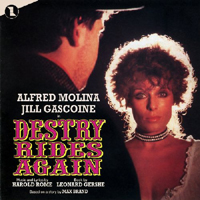 Original London Cast, 1982 (JAY) No stars; not recommended. It took Destry Rides Again almost a quarter-century to get from Broadway to London. In the interim, the musical theater had changed greatly on both sides of the Atlantic, so it’s not surprising that what used to be a show with lots of dancing girls, prostitutes, and cowboys was downsized. The London cast of 19 had only three women, which meant the deletion of “Respectability. ” Almost all cast members doubled as the show’s band; the orchestration is reduced to what sounds mainly like guitars and violins with a bass, harmonica, trombone, and a barely audible piano. This approach has a calamitous effect on the score, and musical director Chris Walker must take at least some of the blame for it. Alfred Molina is low-keyed and ineffective as Destry, while Jill Gascoine sounds pained as Frenchy; her singing grates on the ear, and she only partly compensates with her acting. Harold Rome wrote a wonderfully tuneful score for this show, but this recording manages to disguise that fact. — J.D.
Original London Cast, 1982 (JAY) No stars; not recommended. It took Destry Rides Again almost a quarter-century to get from Broadway to London. In the interim, the musical theater had changed greatly on both sides of the Atlantic, so it’s not surprising that what used to be a show with lots of dancing girls, prostitutes, and cowboys was downsized. The London cast of 19 had only three women, which meant the deletion of “Respectability. ” Almost all cast members doubled as the show’s band; the orchestration is reduced to what sounds mainly like guitars and violins with a bass, harmonica, trombone, and a barely audible piano. This approach has a calamitous effect on the score, and musical director Chris Walker must take at least some of the blame for it. Alfred Molina is low-keyed and ineffective as Destry, while Jill Gascoine sounds pained as Frenchy; her singing grates on the ear, and she only partly compensates with her acting. Harold Rome wrote a wonderfully tuneful score for this show, but this recording manages to disguise that fact. — J.D.



 (2 / 5) Can so trite and scattershot a revue about the joys of moviegoing really have charmed Broadway audiences for 588 performances? Apparently, thanks to a bright young cast including David Garrison and a Tony-winning Priscilla Lopez, and some clever staging by Tommy Tune. But the first half, on disc at least, is dreary indeed: a salute to Richard Whiting here, a tap-danced Production Code number there, some middling additional songs by Jerry Herman (although Lopez does shine in “The Best in the World”), and only Wally Harper’s excellent piano arrangements to spice up the Dick Vosburgh-Frank Lazarus score. Things perk up greatly in Act II, a version of Chekhov’s The Bear as it might have been filmed with the Marx Brothers. Garrison is a super Groucho, Peggy Hewett a model Margaret Dumont, and “Samovar the Lawyer” (“I’m wise to all the loopholes / I haven’t any scroop-holes”) a piece of special material so funny that Groucho himself might have pounced on it. But the ingenuousness is over-peddled — young lovers Kate Draper and Stephen James are actively annoying — and, throughout, the movie satire points are excruciatingly obvious. Still, the recording does have some nice moments, mostly from Lopez and Garrison. — Marc Miller
(2 / 5) Can so trite and scattershot a revue about the joys of moviegoing really have charmed Broadway audiences for 588 performances? Apparently, thanks to a bright young cast including David Garrison and a Tony-winning Priscilla Lopez, and some clever staging by Tommy Tune. But the first half, on disc at least, is dreary indeed: a salute to Richard Whiting here, a tap-danced Production Code number there, some middling additional songs by Jerry Herman (although Lopez does shine in “The Best in the World”), and only Wally Harper’s excellent piano arrangements to spice up the Dick Vosburgh-Frank Lazarus score. Things perk up greatly in Act II, a version of Chekhov’s The Bear as it might have been filmed with the Marx Brothers. Garrison is a super Groucho, Peggy Hewett a model Margaret Dumont, and “Samovar the Lawyer” (“I’m wise to all the loopholes / I haven’t any scroop-holes”) a piece of special material so funny that Groucho himself might have pounced on it. But the ingenuousness is over-peddled — young lovers Kate Draper and Stephen James are actively annoying — and, throughout, the movie satire points are excruciatingly obvious. Still, the recording does have some nice moments, mostly from Lopez and Garrison. — Marc Miller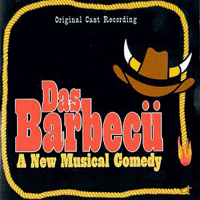
 (3 / 5) This is a country-western musical takeoff on Richard Wagner’s Der Ring des Nibelungen, set in Texas. It’s one-of those cases where the show stands on its own but you’re likely to enjoy it more if you’re familiar with the source material. Das Barbecü is filled with clever songs by composer Scott Warrender and lyricist Jim Luigs. The tone is firmly established by the toe-tapping opening number, ”A Ring of Gold in Texas.” Other titles — “Hog-Tie Your Man,” “Rodeo Romeo,” “Slide a Little Closer” — are clues to what the listener is in for. The score also includes some nice ballads, such as “County Fair,” “River of Fire,” and “Wanderin’ Man.” Helping to make this recording highly listenable are the first-rate singing actors Julie Johnson, J. K. Simmons, Jerry McGarity, Sally Mayes, and Carolee Carmello, all of whom play multiple roles including Wotan, Siegfried, Fricka, Brünnhilde, Gutrune, and Alberich. — Michael Portantiere
(3 / 5) This is a country-western musical takeoff on Richard Wagner’s Der Ring des Nibelungen, set in Texas. It’s one-of those cases where the show stands on its own but you’re likely to enjoy it more if you’re familiar with the source material. Das Barbecü is filled with clever songs by composer Scott Warrender and lyricist Jim Luigs. The tone is firmly established by the toe-tapping opening number, ”A Ring of Gold in Texas.” Other titles — “Hog-Tie Your Man,” “Rodeo Romeo,” “Slide a Little Closer” — are clues to what the listener is in for. The score also includes some nice ballads, such as “County Fair,” “River of Fire,” and “Wanderin’ Man.” Helping to make this recording highly listenable are the first-rate singing actors Julie Johnson, J. K. Simmons, Jerry McGarity, Sally Mayes, and Carolee Carmello, all of whom play multiple roles including Wotan, Siegfried, Fricka, Brünnhilde, Gutrune, and Alberich. — Michael Portantiere
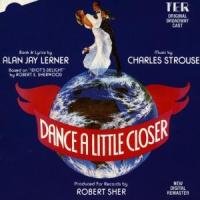

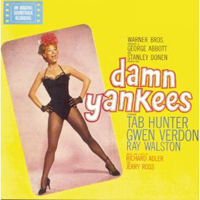
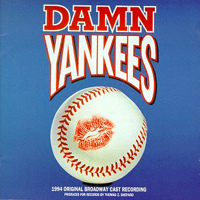
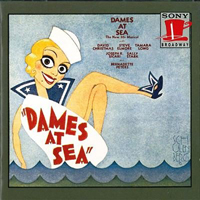
 (5 / 5) Jim Wise, George Haimsohn, and Robin Miller’s ingenious salute to the Busby Berkeley movie musicals of the early ’30s never hits a false note. The show’s spoofing is so expert and affectionate that its first production in a Greenwich Village cafe soon made its way to the Bouwerie Lane and then to the Theatre de Lys, where it ran and ran. This album replaces the show’s two-piano accompaniment with wonderful full-orchestra arrangements by Jonathan Tunick, an orchestrator as talented as the hopefuls onstage. The central joke of the original production was staging huge production numbers in a tiny space with a cast of six. Of those original players, only Bernadette Peters went on to stardom. While she’s an adorable Ruby, the others are just as expert and lovable: Tamara Long’s temperamental star; Sally Stark’s best-buddy blonde; Steve Elmore as the producer and sea captain; and David Christmas as Dick, a songwriting sailor (“Why, I can see it now! As if it were happening on this very stage!”). As Lucky, Joseph R. Sicari partners Stark nimbly in “Choo-Choo Honeymoon” and is ingratiating in “Singapore Sue.” A nod to the CD booklet’s evocative production stills and to Marc Kirkeby’s smart notes. — Marc Miller
(5 / 5) Jim Wise, George Haimsohn, and Robin Miller’s ingenious salute to the Busby Berkeley movie musicals of the early ’30s never hits a false note. The show’s spoofing is so expert and affectionate that its first production in a Greenwich Village cafe soon made its way to the Bouwerie Lane and then to the Theatre de Lys, where it ran and ran. This album replaces the show’s two-piano accompaniment with wonderful full-orchestra arrangements by Jonathan Tunick, an orchestrator as talented as the hopefuls onstage. The central joke of the original production was staging huge production numbers in a tiny space with a cast of six. Of those original players, only Bernadette Peters went on to stardom. While she’s an adorable Ruby, the others are just as expert and lovable: Tamara Long’s temperamental star; Sally Stark’s best-buddy blonde; Steve Elmore as the producer and sea captain; and David Christmas as Dick, a songwriting sailor (“Why, I can see it now! As if it were happening on this very stage!”). As Lucky, Joseph R. Sicari partners Stark nimbly in “Choo-Choo Honeymoon” and is ingratiating in “Singapore Sue.” A nod to the CD booklet’s evocative production stills and to Marc Kirkeby’s smart notes. — Marc Miller

